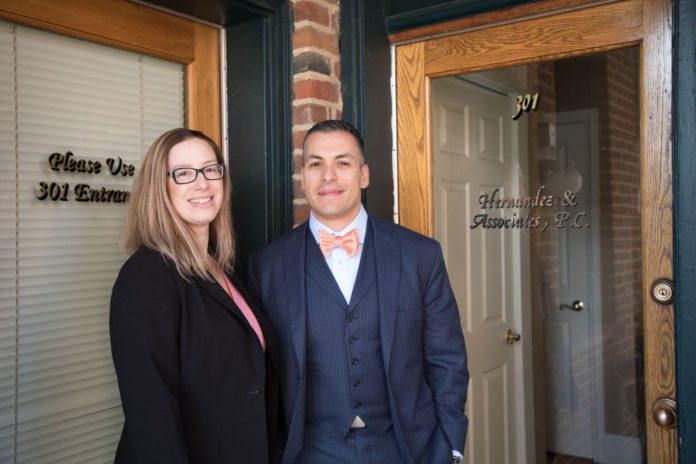

Conventional wisdom tends to caution against going into business with friends. Differing goals, visions or work ethic can lead to disaster for both the business and the friendship. But some law firm partnerships are made of the ultimate relationship bond: spouse teams.
Married couples might go into law practice together for any number of reasons, whether because of the increased flexibility for raising a family or simply because it seems like a natural partnership. And they seem less prone to the problems that can break businesses started by friends.
“That’s not always the case,” said Linda Chalat, partner of Chalat Hatten & Banker and one half of the firm’s original duo with her husband, Jim. “There’s always a little bit of a pull when you’re working in a friendship basis.” She added minor disputes can quickly amplify in a team of friends. “In a marriage, you know you’re in it for the long haul, so you’re going to work it out. You’re not going to have a divorce over whether your version of the pleading gets filed.”
Linda joined Jim in his solo personal injury practice 30 years ago. She said professional service businesses might be more conducive to spouse teams at the helm than other types of businesses because of the flexibility to set hours and workload. They decided to practice together, she said, because it gave them more flexibility to raise their children and still serve their clients well.
“We didn’t just fall into it, we actually talked about it and decided we were going to be business partners as well as raising a family together,” Linda said. She explained the flexibility of practicing together has allowed them to stay involved in their children’s education and social lives over the years, whether at their sporting events or PTA meetings.
Immigration and criminal defense attorney Arnulfo Hernández started Hernandez & Associates in 2007 with his wife, Christine. They went into practice together because they knew right out of law school that the BigLaw environment wasn’t for them, and before they had any children seemed like the perfect time to take the risk of starting their own firm.
Although Arnulfo now largely handles the criminal work and Christine takes the immigration cases, they still occasionally work on cases together.
“I think trial work with Christine is enormous fun, because it’s someone that you trust,” Arnulfo said. “It’s someone that you’ve known for years and years and years. And you know exactly where they’re going before they even get there, and you complement each other so well.” He called it a “luxury” to have someone close who will give him honest but respectful feedback about his case approaches.
“It helps that we don’t practice in the exact same area of the law,” Christine added. “He lets me be the expert in immigration, and I let him be the expert on the criminal side. That way we’re not competing with each other.”
Linda said she used to run into more blatant chauvinism about her business partnership with Jim when she started practicing decades ago. Some people mistook her for the firm’s secretary or questioned whether she was really at the firm to be a tax shelter for her husband’s income. But she has seen those assumptions largely evaporate, she said.
“I’d like to think in this day and age it’s much less common,” Linda said. “It’s at your own peril that you make any assumptions about somebody’s particular contribution to a law firm based on sex.”
Linda said she believes the spouse dynamic works better than that of mere friends going into business together because, at the end of the day, they always find common ground since they have the same goals.
But even the best spouse teams disagree sometimes over how best to achieve their firms’ goals. Linda and Christine say constant discussion and communication is the key to resolution.
“We talk at lunch, which is our office meeting,” Christine said. “And if we don’t agree, then it’s going to carry over until we get home [and] talk about it again at dinner. It’s just a continuing conversation until we get to an agreement.”
Linda said she and Jim reach compromises when they disagree by generally letting whoever of has the stronger conviction about their position take the lead, unless the other feels equally strongly about their own perspective.
Arnulfo added compromise, sacrifice and willingness to look at the entire picture of a situation are key, but moving the firm toward its goals as a result is worth it.
“This business does teach you a little bit about law, it does teach you a little bit about what you have as a partner,” Arnulfo said. “But so long as you welcome it, and so long as everyone’s part of the family, it’s going exactly the way we thought.”
—Julia Cardi

